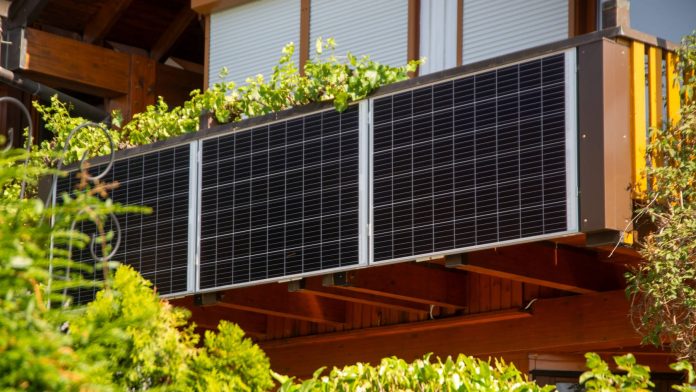Even more relief for owners of balcony power plants: After months of waiting, the “Solar Package I” is now coming into force. This is what you should know.
The most important things at a glance
It is now even easier to generate and use your own electricity and even get money for it. With the “Solar Package I”, the Federal Ministry of Economics (BMWK) is now making it easier for private households to put solar systems into operation and to operate them. We have summarised the details on the seven pages here.
Debureaucratize balcony photovoltaic systems
It will be easier to operate a mini photovoltaic system on the balcony. Registration with the network operator is no longer necessary. In addition, the registration in the market master data register, which is still necessary, has been simplified. Less data is required, which users can easily find out, according to the ministry.
Another plus: the balcony power plant can now be put into operation even if no bidirectional meter (digital electricity meter) is installed. Until this is installed, the “old reverse-rotating meter will be tolerated,” it is said.
There should also be some simplification when connecting the devices: although only special power plug devices that take into account the requirements of DIN VDE 0100-551 and DIN VDE V 0100-551-1 or a fixed connection are currently permitted, according to the VDE. “With the planned publication of the product standard DIN VDE V 0126-95, further solutions for use with a household socket will be defined,” explain the experts. The standard is currently being developed and will be published in the course of 2024.
More efficient
In addition, one or more mini PV systems can be connected to an installed power line. However, this is only possible if the output of the line is less than two kilowatt hours (kWh) and the output of the inverter is not higher than 800 volt-amperes (VA). In addition, the relevant regulations for the implementation of the grid connection must still be observed.
With the “Solar Package I”, the feed-in limit for plug-in solar systems will also be raised from 600 to 800 watts. The VDE will also present corresponding technical specifications for mini photovoltaic systems in the foreseeable future.
Better billing
Anyone who feeds all of their solar power into the public grid can now more easily get their payment. Previously, a separate electricity supply contract was required for full feed-in, which resulted in high costs that were perceived as disproportionate.
The BMWK now explains that it is now possible to bill electricity quantities via an existing electricity supply contract under certain conditions.
And: Photovoltaic systems that are older than 20 years and are therefore no longer eligible for EEG funding can continue to feed the electricity they generate into the grid. This is then sold to the grid operators at market value. This regulation is to apply for around five years.
Store solar power
The exclusivity principle is being adjusted. This means that stored electricity can also be used for trading in grid electricity. However, it must be ensured that the electricity sold in this way does not receive additional funding.
Community building supply
From now on, a photovoltaic system can supply the entire house with solar power – and with “a minimum of bureaucracy”, as the law states. This means that solar power can be distributed without the owner or operator having to register as a supplier in advance. Accordingly, many obligations were imposed on them – which in turn complicated the distribution of electricity.
In addition, the surplus feed-in into the grid will continue to be remunerated in accordance with the EEG.
Plug-in solar devices defined by law
The “Solar Package I” now defines mini photovoltaic systems or plug-in solar systems as a separate system category. This benefits operators of balcony power plants with up to 800 watts of inverter and 2,000 watts of module output.
overview
- Solar Package I in forceThe Federal Ministry for Economic Affairs and Energy (BMWK) is making the use of balcony power plants easier through new regulations.
- DebureaucratizationRegistration with network operators is no longer necessary; registration in the market data register is simplified.
- Old electricity meters allowedBalcony power plants may temporarily operate without a digital electricity meter.
- easy installationNormal sockets are sufficient, special power sockets are no longer necessary. The VDE creates special rules/standards for this.
- More efficientIncrease in the feed-in limit for plug-in solar systems from 600 to 800 watts, technical specifications to follow.
- Better billing
Full feed-in possible without a separate electricity supply contract, billing is done via existing contract. - Community building supplyPV systems can supply entire buildings with minimal bureaucracy and without supplier registration.


